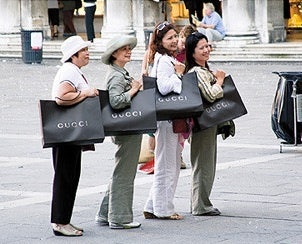Significant Proportion Of Mainland China Sales Come From Lower-Priced Accessories#

China's luxury market is increasingly segmented
This week, Yang Zhaohui of the China Fashion Network penned an op-ed about the complexities of the Chinese luxury market, writing that despite the flowery language often used to describe this fast-growing market, it is far more contradictory and segmented than many would think. Yang, noting that there are two major types of luxury consumer in China right now -- the conspicuous consumer and the more sophisticated shopper -- looks deeper into consumer trends and calls attention to a group she calls "Madame Bovaries," younger women who save up for months for luxury goods, yet their meager income only allows them to purchase smaller accessories.
From Yang's article (translation by Jing Daily team):
To most people, the idea of the "Chinese luxury consumer" evokes two different images: One wears a well-tailored Armani suit, has his own office in a nice building, speaks fluent English, and travels to Europe every year for a one-month-long vacation; The other sloppily dons a Pierre Cardin suit and a Goldlion belt, and speaking Mandarin with a thick accent, barks at a Hong Kong store clerk, "I wanna buy a Rolex gold watch."
Currently, China's luxury consumption remains in the "conspicuous consumption" or "competition in consumption" stage. Of course, there are some consumers who are highly educated and erudite, some rich second- and third-generation individuals, and those who have had experience living abroad -- all of whom have learned how to enjoy luxury goods. They pursue a higher quality of life and look to reflect their personal tastes through luxury consumption.
But since the early days of China's "reform and opening up," a large number of nouveau riche and bigwigs were born. Early on, these nouveau riche were commonly seen wearing what were referred to at the time as "dog chains" -- thick ropes of gold around their neck -- and loudly boasting into mobile phones. (Rare in those days.) Soon, these people began to buy luxury cars and mansions, traveling overseas to buy luxury goods, and eventually taking part in tour groups focused solely on buying luxury goods in Europe, sweeping through stores and leaving people dumbstruck. A good example [of conspicuous consumption in China] is how Louis Vuitton has recently sought to cultivate a more low-key image with its latest collections, yet at stores in mainland China the company must continue to stock old models that prominently display the LV logo, or else they know they won't sell any bags.
In China, many people live frugally for months to buy an LV key chain, a pair of Chanel sunglasses or a Prada wallet. I heard a joke once about a girl sitting on a bus was carrying an LV bag that was ripped apart by a robber, who was looking to steal the mobile phone and 1,000 yuan she was carrying. As the man ran away, leaving the girl with a destroyed LV bag, she screamed, "If you wanted the money you should've just said something. Why'd you have to destroy my bag?". Recently, "Fashion" magazine referred to the kind of bag-obsessed young woman you see in China nowadays as a "Madame Bovary" -- her income is too low to afford luxury handbags, but through buying relatively inexpensive accessories she can feel like she's a part of the upper class. This kind of consumer actually makes up a pretty high proportion of the luxury goods consumer market in China.
The other kind of Chinese luxury consumer focuses on "competition through consumption," and a considerable amount of their consumption is geared towards doing business, meaning an item's social communication and packaging are more important to them. For them, the purchase of a luxury item is a way to stick a label on themselves, draw them into a certain social circle, and bring them opportunities. Another use of luxury purchases for this group is to give away as a high-end gift, since it's tacky to just give someone money. For example, LOTOS glasses [from Germany] are a hot commodity in China, and a considerable number of sales come from people who give pairs as gifts to government officials who have a yen for low-key luxury.
From my point of view, luxury is innocent, and it has its uses. I don't have any objection to luxury, I just don't like the blind pursuit and blind worship of it [you often see in China].
Someday, the attitude of Chinese people towards luxury consumption will stop being one of "buying luxury, buying status," and one that is gradually more mature. However, this will be a long process and take a lot of time and money. By that point, China will likely have its own international luxury brands.